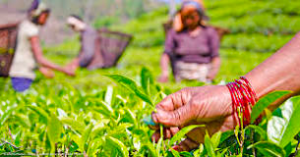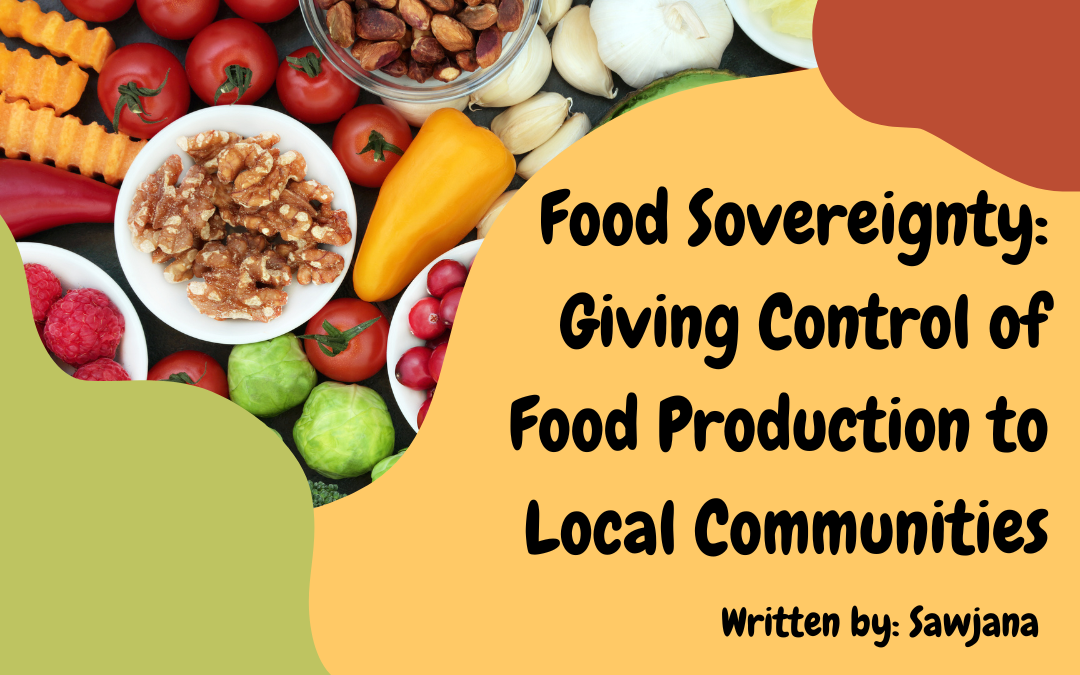Written by: Sawjana
Edited by: Kiritika Rana
Designed by: Ayesha
Published by: Kiritika Rana
In a world characterized by globalization and industrialization, food sovereignty has  gained significant attention as a way to address the challenges local communities face in maintaining control over their food production systems. Food sovereignty emphasizes the right of communities to determine their own food and agriculture policies, free from external interference. This article explores the importance of food sovereignty, its benefits, and how it empowers local communities to take charge of food production.
gained significant attention as a way to address the challenges local communities face in maintaining control over their food production systems. Food sovereignty emphasizes the right of communities to determine their own food and agriculture policies, free from external interference. This article explores the importance of food sovereignty, its benefits, and how it empowers local communities to take charge of food production.
**Understanding Food Royalty**
Food sovereignty is not just about producing food locally; it’s a broader concept that encompasses the rights of communities to define their own agricultural and food systems. This includes deciding what crops to grow, how to grow, and how to distribute and consume them. It puts the well-being of people and the environment at the center of agricultural practices rather than solely focusing on profit-driven production.
**The Benefits of Food Sovereignty**
- **Cultural Preservation:** Food sovereignty recognizes the cultural significance of traditional farming methods and local diets. By allowing communities to decide about their food systems, cultural heritage and practices are preserved, enhancing social cohesion and identity.
- **Environmental Sustainability:** Local communities are intimately connected to their land and ecosystems. Food sovereignty encourages sustainable agricultural practices adapted to local environmental conditions, minimizing the negative impacts of large-scale monocultures and chemical-intensive farming.
- **Economic Resilience:** When local communities control their food production, they are less susceptible to the volatility of global markets. This resilience can provide a safety net during economic instability, ensuring food availability even in challenging circumstances.
- **Nutritional Health:** Food sovereignty encourages diverse, locally adapted crops that contribute to a more varied and nutritious diet. This can lead to improved health outcomes and a reduced reliance on heavily processed, imported foods.
**Empowering Local Communities**
- **Decision-Making:** Food sovereignty empowers communities to make decisions collectively, ensuring their needs and priorities are met. Local knowledge and practices are valued, enhancing the overall sustainability of the food system.
- **Land Rights:** Many local communities face challenges related to land ownership. Food sovereignty reinforces the importance of securing land rights for indigenous peoples and small-scale farmers, enabling them to steward their land and resources for future generations.
- **Seed Sovereignty:** The control over seed resources is a critical component of food sovereignty. Communities can save and exchange traditional seeds, reducing dependence on commercial sources and preserving genetic diversity.
- **Market Access:** Food sovereignty accepts trade but promotes fair and equitable trading relationships. Local markets and direct consumer-producer connections are encouraged, providing economic opportunities for small-scale farmers.
**Challenges and the Path Forward**
Despite its merits, achieving food sovereignty can be challenging. Structural issues, such as unequal land distribution and lack of access to resources, often hinder communities from fully realizing their food sovereignty goals. Advocacy, policy changes, and international cooperation are essential in creating an enabling environment for food sovereignty to thrive.
Food sovereignty represents a powerful movement that places local communities at the forefront of their food systems. We can foster environmental sustainability, cultural preservation, and economic resilience by granting communities control over their food production. The journey towards achieving food sovereignty requires collaboration among governments, NGOs, and communities to create a just and sustainable food future for all.
Work Cited
https://www.tandfonline.com/doi/full/10.1080/03066150903143079
https://www.frontiersin.org/articles/10.3389/fsufs.2021.686492/full
https://www.bia.gov/service/indigenous-tourism/why-food-sovereignty-matters

